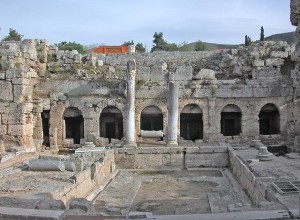
Click Here to download my e-Book about historical, literary, and personal examples to use for the SAT Essay, with quotes, impressive vocab words, and more!
Do you know what to write about on the day of the SAT?
This blog post will get students started thinking about what evidence they bring to the SAT essay so that they always have something to say!
Preparing your evidence for the SAT essay in advance is one of my top 10 tips for the essay.
This post is a miniature version of my complete e-Book on 30 of the most effective examples to use as supporting evidence in your SAT essay body paragraphs.
I wrote that e-Book so that a student warming up for the SAT essay could easily get access to good SAT essay evidence examples that he or she can use to answer a broad variety of SAT essay prompts.
In the book, I provide a brief summary, an SAT vocabulary word and meaning, two memorable quotes, and 10 key facts about EACH of the 30 evidence examples (which come from a variety of fields like sports, literature, history, personal experience, etc).
Get Exclusive SAT Prep Tips!
I want to send you more tips to help your SAT score, but I need your email address to stay in touch. Enter your email below so I can send you my reports on the SAT and other subscriber-only bonuses.
That report will be incredibly valuable to you if you worry about “not knowing what to say” when you see the SAT essay prompt.
Today we’ll get a mini-version of those SAT Essay Examples:
In this post, I’m going to give a quick overview of some top historical examples for the SAT Essay.
We won’t necessarily have the time to get into those cool quotations, summary paragraphs, etc that are contained in the complete e-Book version, but there will still be a lot of great info.
There are many great examples from history to use for the SAT essay, but here are five that you may already know about. I’ve identified some common SAT essay topic themes that each piece of evidence will work for.
1) The Fall of Rome (476 A.D.)

The Roman Empire was among the most powerful civilizations, yet it crumbled into ruin. How can we write about it on the SAT?
Themes:
- Leadership: Incompetent emperors and military leadership may have played a part in the decline of the empire
- Civic duty: The spoiled Roman citizens began to hire more and more mercenaries to defend their borders – paid soldiers with no personal loyalty to the Empire. The Romans may have been better off if they had defended themselves, instead of paying and trusting outsiders to take care of them.
- Imperialism: The Roman Empire was too big to govern effectively and outer territories were not well-defended.
- Decadence: The upper-class of the Roman Empire had so much wealth that they may have been complacent about the dangers to their empire; the oppressed lower classes may have wanted the Empire to fall, as this would benefit them directly.
2) The American Civil War (1861-1865)
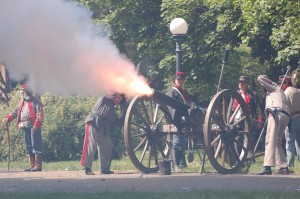
In the civil war, brother fought brother. Some fought for freedom, others fought for oppression. Says a lot about human nature, doesn’t it?
Themes:
- Freedom: One of the major causes of the war was the country’s division over the possession of black slaves and some historians see the war as one huge battle for human freedom and independence.
- Divided loyalties: Families were divided on the issues and often found themselves arguing or even physically fighting one another, in order to support their beliefs.
- Leadership and authority: The southern states rebelled against Lincoln’s leadership and denied his authority over them; he was forced to go to war in order to reassert that authority and leadership.
- Violence as a solution: The American Civil War is an historical example of violence being the only apparent solution to an impossible problem – reuniting a divided nation and asserting Lincoln’s presidential authority.
3) The Vietnam War (1955-1975)

A time of confusion and argument. Moral issues became clouded, making it very flexible evidence for a variety of SAT essay prompts.
Themes:
- Power and imperialism: The powerful United States was staging a self-interested, imperial, political intervention in a foreign country; many have argued that it was not our place to do so, and we should have simply let the Vietnamese choose their own form of government.
- Fear and violence: Fear of worldwide Communist takeover motivated a violent response: an armed military intervention in a distant foreign country.
- Lost youth: The young male soldiers (frequently African-American) who were drafted to fight had little choice and were forced to risk their lives in a conflict that didn’t benefit them at all.
- Exploitation by the powerful: It was mainly the poor males who were drafted; the rich and powerful politicians were looking out for their own interests at the expense of their less-powerful fellow citizens.
- “Is more/bigger always better?”: The massive American army was still unable to dislodge the highly-motivated guerilla warriors of North Vietnam.
- Courage facing impossible odds: The Viet Cong were facing an enemy enormously more well-armed and powerful than themselves, but believed so strongly in their cause that they refused to give up and eventually forced the more powerful U.S. army out of their country.
4) The American Black Civil Rights Movement (1955-1968)

Forces fighting for change battle with forces of oppression as blacks in the USA fight for freedom and human rights.
Themes:
- Change and Protest: Both violent and non-violent protests, like the Montgomery Bus Boycott, the Freedom Riders, and sit-ins were effective in calling attention to the plight of black Americans, and also put economic and social pressure on existing instutitions that encouraged racial discrimination.
- Rebellion against authority: Rosa Parks, MLK Jr., and Malcolm X were all heros and rebels against the white establishment.
- Personal rights: African-Americans demanded equal rights as human beings, and refused to allow their human dignity and rights to be violated any longer.
- Oppression: Segregation was designed to oppress and control African Americans, and it worked for a time, but eventually it became unendurable and led to a form of uprising.
5) Woodstock (1969)
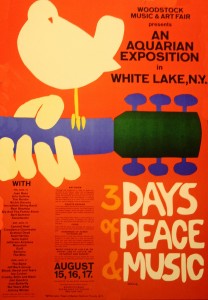
Ever heard of the Hippies? Woodstock was a music festival that represented hopes and dreams for a generation. Peace, love, rebellion, rock music, and a dark side.
Themes:
- Art’s relationship to society: The music and lyrics greatly affected the society of the era, calling attention to the mistake of the Vietnam War and the equality of all human beings.
- Youth vs. elders: Woodstock was attended mainly by young men and women who wanted something “different” than the lives that their parents and authority figures were offering them.
- Rebellion and risk-taking: Drugs, nudity, loud rock music, and escape from authority were all major themes of this massive music festival.
- Idealism vs. pragmatism: Woodstock was essentially founded on ideals of youth, rebellion, and free thinking; however, because the festival organizers were perhaps not the most practical people, the festival was overrun by 10 times as many people as was expected.
- Extra: Jimi Hendrix shredding “The Star-Spangled Banner” on electric guitar (considered one of the defining moments of Woodstock; Hendrix called attention to the corruption of the once-pure ideals of the United States by incorporating violent and agonizing sounds into the national anthem. The electric-guitar version of the old-school anthem was a clear sign of the times and the upcoming social changes.)
Want deeper analysis and more SAT Essay Evidence?
These five top historical examples for the SAT essay are at least enough to get you started on your SAT essay prep.
Ideally, you should have between 5 and 10 well-researched history and literature examples that you feel comfortable writing about, supported by quotations and specific evidence, before the day of the test.
Ready to get deeper into thematic analysis, supporting quotations, and broader selections of evidence? Check out my SAT Essay Examples Book with 30 more examples to use for any SAT essay topic!
Further Reading:
What is the SAT Essay?
Top 5 Literature Examples for the SAT Essay
The Top 10 Tips for Your SAT Essay
How to Write a Great 5-Paragraph Essay
Additional Resources:
Top 30 Examples to Use for SAT Essay Evidence (e-Book)
Write the Best SAT Essay of Your Life! (e-Book)
Conquer SAT Vocabulary (Video Course)
Be sure to join my free SAT mailing list before you go! I’ll send my Urgent Report on SAT Reading and other exclusive test prep content for subscribers only!


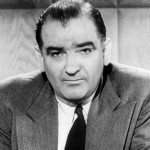



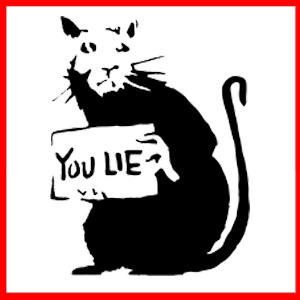



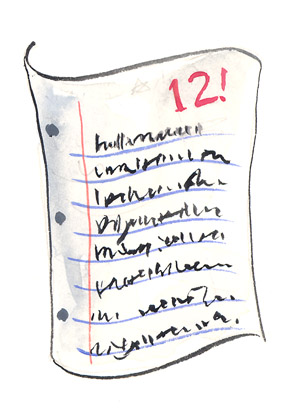







Thank you so much for posting these great ideas.I am taking my SAT tomorrow and I am going through all these examples so that I can provide great evidences to support my essay.Writing essay had always been my weakness in SAT but after reading this I have built up confidence and I’m eager to take it.
Thank you so much once again.
:)
I’m really glad it helped Sarishma! I think a lot of students just have no idea what to write about when they first see the SAT essay and get really intimidated and scared! Preparation is half the battle :)
thankyou…it helpd alott..i m giving sat tomorw…n this last minute examples is perfect…keep up the good work!!!!
Hey, glad it helped! :)
[…] http://www.esatpreptips.com […]
Cheers for this article! It was very helpful :)
Hey, these topics were really idealistic and thoughtful
i’m egyptian and taking my SAT within months , these ideas couldn’t have come in a better timing xD thanks so much
Awesome (; I enjoyed writing and sharing these examples with people!
You should check out my books if you liked this article – I think they have a similar helpful spirit!